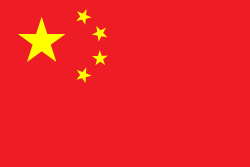| China at the 2009 East Asian Games | |
|---|---|
 | |
| IOC code | CHN |
| NOC | Chinese Olympic Committee external link (in Chinese and English) |
| in Hong Kong | |
| Flag bearer | Liu Zige |
| Medals Ranked 1st |
|
| East Asian Games appearances | |
China competed in the 2009 East Asian Games held in Hong Kong from December 5, 2009 to December 13, 2009. China finished first with 113 gold medals. [1]